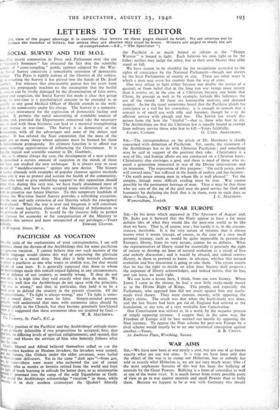POST WAR EUROPE
Siat,—In his letter which appeared in The Spectator of August 2nd, Dr. Jacks put it forward that the Nazis appear to have a far more definite idea of what they would like the post-war world to be like than we have. That is, of course, true ; but surely it is, in the circum- stances, inevitable: It is the very nature of tyranny that it always knows what it wants (except, of course, in the case of a very small personal tyranny, such as would be quite impossible in present-day Europe); liberty, from its very nature, cannot be so definite. What the representatives of liberty stand for essentially is precisely the right of society to develop on lines of natural evolution as a result of free and orderly discussion ; and it would be absurd, and indeed contra- dictory, in them to pretend to know, in advance, whither that natural evolution and free discussion is going to take them. The tyrant asserts that he has the right to decide on what lines Society shall progress ; the exponent of liberty acknowledges, and indeed insists, that he has, and can have, no such right.
We can learn a lesson here, I think, from our own history. When James I came to the throne, he had a neat little ready-made theory as to the Divine Right of Kings. The people, and especially the Parliament, who opposed him did not assert against him any ready- made rival theory. They were content, merely, with opposing the King's claims. The result was that when the hurly-burly was done, and the last Stuart had been got rid of, England had arrived at the foundation, at any rate, of a very workable free Constitution.
Our Constitution was arrived at, in a word, by the negative process of simply opposing tyranny. I suggest that, in the same way, the Freedom of Europe will be best worked out merely by opposing the Nazi tyranny. To oppose the Nazi scheme for post-war Europe by a rival scheme would merely be to set one tyrannical conception against another.—Yours, A. R. CRIPPS. ro Ambrose Place, Worthing, Sussex.






























 Previous page
Previous page